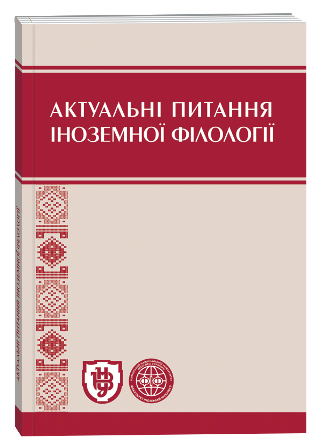СТРАТЕГІЧНА ДИВЕРСИФІКАЦІЯ АВТОРИТАРНОЇ ДИСКУРСИВНОЇ ПОВЕДІНКИ ДІВЧИНИ-ПІДЛІТКА У МОНОГЕНДЕРНОМУ СПІЛКУВАННІ З ДОРОСЛИМИ
DOI:
https://doi.org/10.32782/2410-0927-2021-14-13Ключові слова:
авторитарність, маніпулювання, моногендерне спілкування, підліток, стратегіяАнотація
Високі темпи розвитку сучасного суспільства залишають відбиток на комунікації особистості у різноманітних сферах її життєдіяльності. Неочікуваними стають трансформації у сфері владних відносин як у діловому, так і родинному спілкуванні. Метою статті обрано продемонструвати особливості імплементації авторитарного спілкування дівчини-підлітка та його стратегічної диверсифікації у моногендерному спілкуванні з жінками, зокрема представниками ядерної (мати, кузина) та не ядерної (лікар, подруги матері, сусіди) зон дискурсивного оточення особистості. Імплементація авторитарності у інтеракції досліджувалася у дорослих мовців у цілому, а також у дитячому авторитарному спілкуванні із дорослими та однолітками, однак, фокусування уваги на диверсифікації стратегічного арсеналу адресанта-підлітка у моногендерних діадах з адресатами-жінками здійснюється уперше. З метою досягнення поставлених цілей дослідження були виконані такі методологічні кроки: відібрано дискурсивні фрагменти, які ілюструють спроби імплементації дівчиною-підлітком авторитарних стратегій; спираючись на здобутки лінгвістичної прагматики і методи контекстно-ситуативного аналізу схарактеризовано, яким чином видозмінюється лінгвістична складова утілення авторитарності із урахуванням фактору адресата спілкування. Встановлено взаємозалежність між прагматичними факторами комунікативної ситуації (зона дискурсивного оточення, психологічна диспозиція, соціальні ролі) та стратегічним репертуаром авторитарного мовця. Підліток вдається до імплементації авторитарного маніпулювання з представниками ядерної зони дискурсивного оточення за рахунок тактик удаваної доброзичливості, апеляції до емоцій та шантажу, та стратегії самоствердження за рахунок тактики образи із мовцями не ядерної зони дискурсивного оточення, із якими спостерігається тенденція до зменшення комунікативної дистанції і зниження регістру спілкування.
Посилання
Козлова В. В. Реалізація виховного впливу в англомовному парентальному дискурсі: структурно-семантичний та прагматичний аспекти : дис. … канд. філол. наук: 10.02.04. Харків, 2012. 219 с.
Крючкова П. Г. Авторитарний дискурс (на матеріалі сучасної англійської мови) : дис. … канд. філол. наук : 10.02.04. Київ, 2003. 193 с.
Пахаренко А. В. Дитина як авторитарна дискурсивна особистість (на матеріалі сучасної англійської мови) : дис. … канд. філол. наук: 10.02.04. Харків, 2020. 260 с.
Пушкин А. А. Прагмалингвистические характеристики авторитарной языковой личности : автореф. дисс. на соискание уч. степени канд. филол. наук: спец. 10.02.19 «Теория языкознания». Чебоксары, 1992. 16 с.
Скриннік Ю. С. Дискурсивна варіативність вербальної та невербальної поведінки мовців при зміні соціальних ролей (на матеріалі англійської мови) : дис. … канд. філол. наук: 10.02.04. Харків, 2019. 247 с.
Солощук Л. В. Вербальні і невербальні компоненти комунікації в англомовному дискурсі : монографія. Харків : Константа, 2006. 300 с.
Blakar R. M. Language as a means of social power. Theoretical-empirical explorations of language and language use as imbedded in a social matrix. Pragmalinguistics: Theory and Practice. 1979. Vol. 85. P. 131–169.
Branje S. Development of parent-adolescent relationships: conflict interactions as a mechanism of change. Child Development Perspectives. 2018. Vol. 12, No 3. P. 171–176. URL: https://srcd.onlinelibrary.wiley.com/doi/full/10.1111/cdep.//12278
Foucault M. Two lectures. Power / Knowledge. Selected Interviews and Other Writings 1972–1977 / ed. C. Gordon. New York : Pantheon Books, 1980. P. 78–108.
Karlberg M. The power of discourse and the discourse of power: pursuing peace through discourse intervention. International Journal of Peace Studies. 2005. Vol. 10, No 1. P. 1–25.
Knafo A. Authoritarians, the next generation: values and bullying among adolescent children of authoritarian fathers. Analyses of Social Issues and Public Policy. 2003. Vol. 3, No 1. P. 199–204.
Kozlova V. V., Bagatska O. V. Verbal manifestation of mother discourse personality in the English parental discourse. Науковий вісник Міжнародного гуманітарного університету. Сер.: Філологія. 2021. № 47. Т. 1. С. 112–116.
Negm M. S. Resisting power in discourse. Procedia: Social and Behavioral Sciences. 2015. No 192. P. 284–289.
Never Have I Ever (2021). URL: https://www.netflix.com/ua-ru/
Schmid Mast M. What can we learn from others’ power from their emotional expressions? The Social Nature of Emotion Expression / ed. U. Hess, Sh. Hareli. Cham : Springer, 2019. P. 179–197.
Soloshchuk L. V. The processes of diversification of the non-verbal communicative components in the modern English discourse. Cognition, communication, discourse. 2020. No. 21. P. 50–60.
Sorokina L. Communicative and pragmatic level of verbal manipulation. Research trends in modern linguistics and literature. 2018. Vol. 1. P. 135–146.







